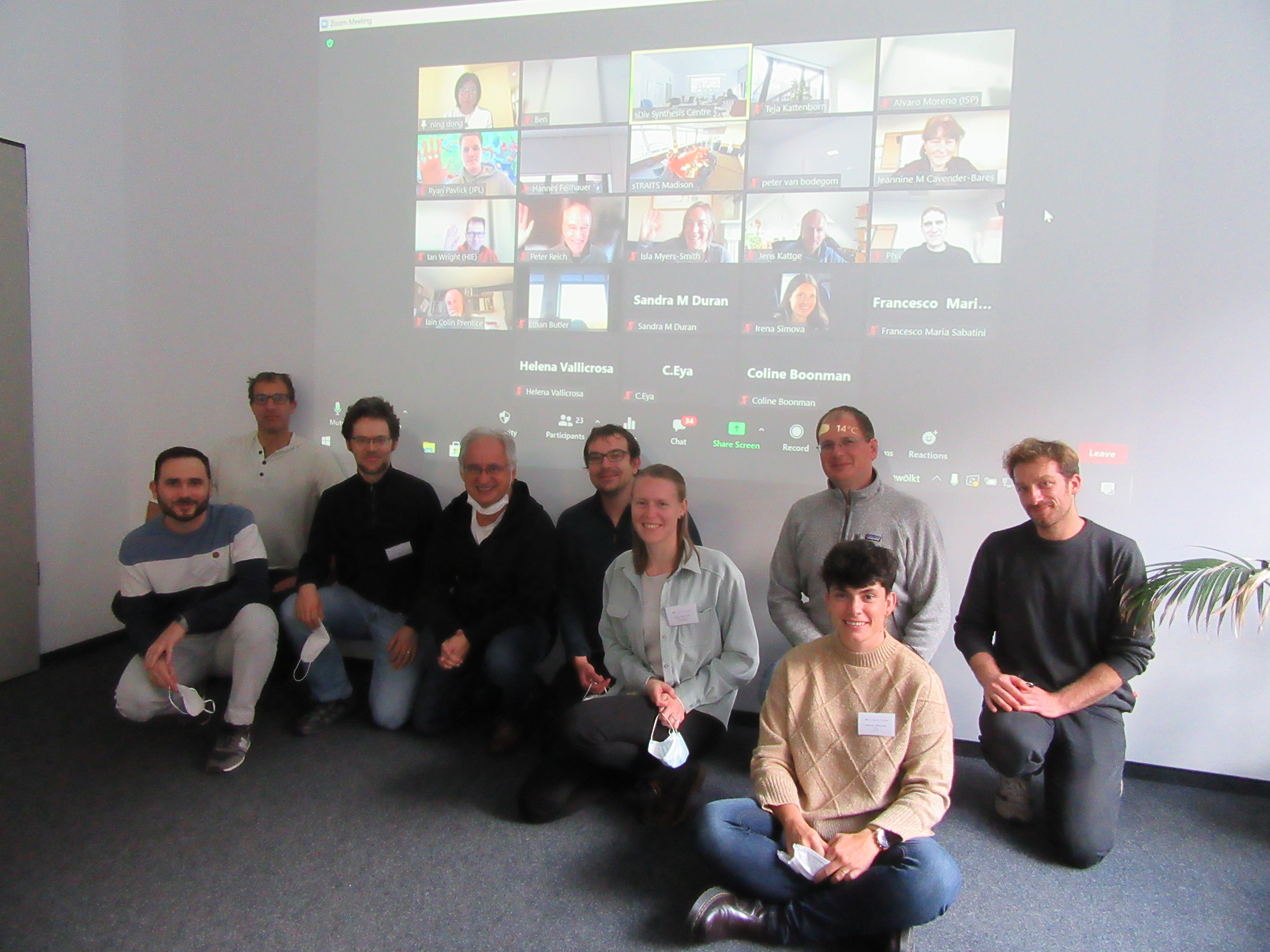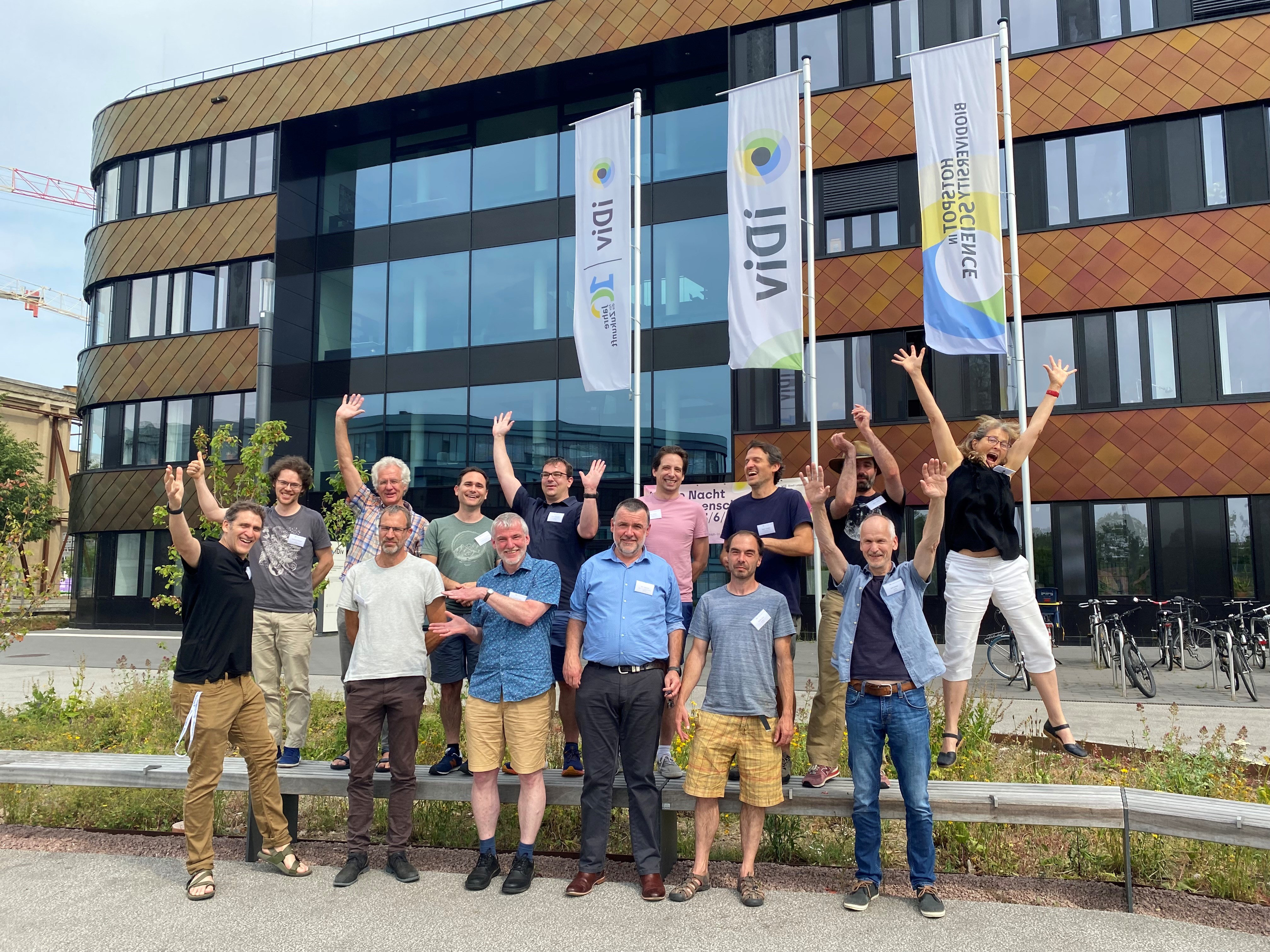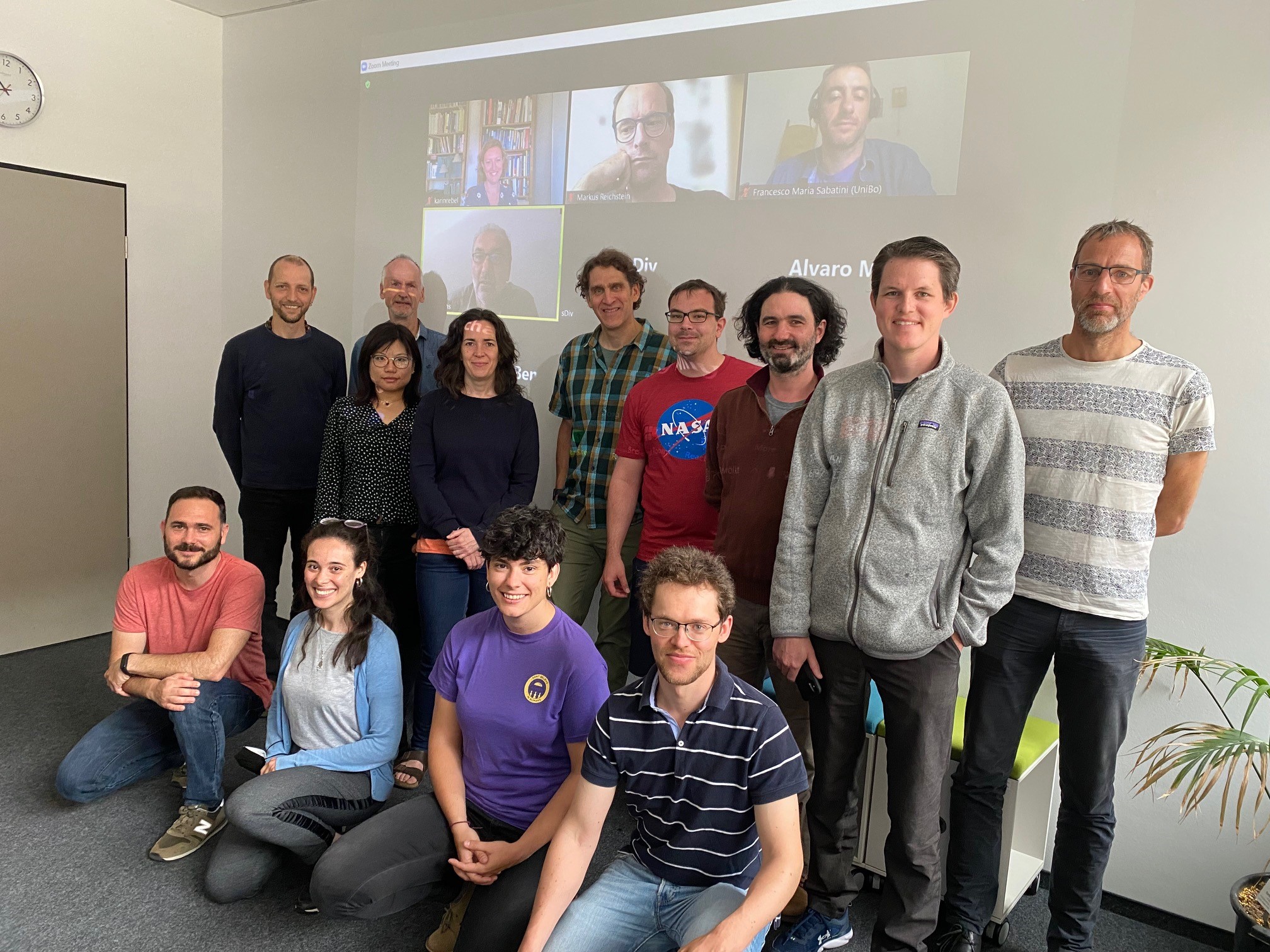sTRAITS
First meeting: 25.-29.10.2021
PIs:
Philip A. Townsend
Ryan Pavlick
iDiv members:
Jens Kattge
Helge Bruelheide
Andreas Huth
Miguel Mahecha
Markus Reichstein
Michael Vohland
Christian Wirth
Working Group Postdoc:
Benjamin Dechant
Project summary:
Plant traits are characteristics of plants that result from evolutionary and community assembly processes and respond to environmental drivers. Trait-based ecology has become an important approach for characterizing diversity, predicting ecosystem function and understanding the consequences of global change. At present, our understanding of trait distributions globally comes from disconnected in-situ measurements collected non-systematically over many years, hyperspectral and lidar remote sensing (none of which are global in extent yet) – and statistical upscaling based on in-situ data. This statistical upscaling is global in extent, but has yet to be validated with independent data, and is likely valid at some scales and not others. We propose to develop consistent, high-resolution (~1km) global-scale data products through the synergistic merger of these data sources. First, we will integrate these data sources to: a) identify gaps in knowledge of trait distributions from in-situ and remotely-sensed sources, b) test the performance of upscaled trait data against remote sensing, and c) develop a synthesis product. Second, we will use this synthesis product to better understand trait-trait and trait-environment relationships at regional to global scales and test how traits and their diversity impact ecosystem function, as derived from other global products such as flux tower networks and satellites. We will develop a framework to estimate plant traits and their diversity across large environmental gradients in order to establish the optimal temporal and spatial coverage for data collection needed to calibrate and validate upcoming global satellite products from NASA and ESA missions in the late 2020s.
In person participants:
Benjamin Dechant (iDiv), Hannes Feilhauer (Leipzig University), Teja Kattenborn (Leipzig University), Sönke Zaehle (Max Planck Institute for Biogeochemistry), Coline Boonman (Radboud University), Jens Kattge (MPI-BGC), Alvaro Moreno-Martinez (Image Processing Laboratory (IPL)), Helena Vallicrosa (CREAF), Fabian Schneider (Jet Propulsion Laboratory / California Institute of Technology), Peter van Bodegom (Leiden University), Jordi Sardans (CREAF-CSIC), Josep Penuelas (CREAF-CSIC)
Participants in Madison:
Ethan Butler (University of Minnesota), Jeannine Cavender-Bares (University of Minnesota), Sandra Duran (University of Minnesota), Ryan Pavlick (Jet Propulsion Laboratory), Philip Townsend (University of Wisconsin-Madison)
Remote participants:
Holly Croft (University of Sheffield), Jesus Aguirre Gutierrez (University of Oxford), Ning Dong (Imperial College London), Nima Madani (Jet Propulsion Laboratory), Isla Myers-Smith (University of Edinburgh), Iain Colin Prentice (Imperial College London), Peter Reich (University of Minnesota), Irena Simova (Charles University, Center for Theoretical Study), Helge Bruelheide (Martin Luther University Halle-Wittenberg), Francesco Maria Sabatini (Università di Bologna), Ian Wright (Macquarie University), Karin Rebel (Utrecht University, Copernicus Institute of Sustainable Development), Yasmina Loozen (ISSeP)


sTRAITS working groups meeting October, 2021
sTRAITS working group meeting June, 2022
Second meeting: 07.-10.06.2022
Participants:
Philip Townsend, Ryan Pavlick, Jens Kattge, Fabian Schneider, Gregory Asner, Coline Boonman, Helge Bruelheide, Jeannine Cavender-Bares, Sandra Diaz, Sandra Duran, Hannes Feilhauer, Andreas Huth, Miguel Mahecha, Roberta Martin, Alvaro Moreno-Martinez, Isla Myers-Smith, Josep Penuelas, Karin Rebel, Peter Reich, Markus Reichstein, Michael Schaepmann, Irena Simova, Peter van Bodegom, Michael Vohland, Christian Wirth, Sönke Zaehle
Third meeting: 19.-23.06.2023
In-person participants
Alvaro Moreno Martínez (University of Valencia / ISP), Ben Sparrow (TERN / The University of Adelaide), Benjamin Dechant (iDiv), Ethan Butler (University of Minnesota, Department of Forest Resources), Fabian Schneider (Jet Propulsion Laboratory / California Institute of Technology), Hannes Feilhauer (Leipzig University, RSC4Earth), Henrique Pereira (iDiv), Jeannine Cavender-Bares (University of Minnesota), Martin Jung (MPI-BGC), Peter van Bodegom (Leiden University) Philip Townsend (University of Wisconsin-Madison), Sönke Zaehle (MPI), Brian Maitner (University at Buffalo), Teja Kattenborn (RSC4Earth, U-Leipzig), Jens Kattge (MPI-BGC), Andreas Huth (Helmholtz Centre for Environmental Research – Ufz), Jasper Slingsby (SoUniversity of Cape Town (South Africa), Helge Brühlheide (MLU)
Remote participants
Ryan Pavlick (Jet Propulsion Laboratory, California Institute of Technology),Julia Tavares (University of Uppsala),ning dong (Imperial College London), Marc Peaucelle (INRAE Bordeaux),Benjamin Loubet (ECOSYS, INRAE- AgroParisTech-Univ. Paris Saclay), Francesco Maria Sabatini (Alma Mater Studiorum University of Bologna), Irena Simova (Charles University, Center for Theoretical Study), Jesus Aguirre Gutierrez (University of Oxford), Josep Penuelas (CREAF-CSIC),Nima Madani (Jet Propulsion Laboratory), Pedro J. Leitão (University of Leipzig), Peter Reich (Universities of Michigan and Minnesota),Pasi Rautio (Natural Resources Institute Finland), Samantha Weintraub-Leff (National Ecological Observatory Network, Battelle), Moses LIBALAH (University of Yaounde I, Cameroon), Ryan Blanchard (South African Environmental Observation Network)


sTRAITS working group meeting June, 2023
Publications:
Dong, N., Dechant, B., Wang, H., Wright, I. J., & Prentice, I. C. (2023). Global leaf-trait mapping based on optimality theory. Global Ecology and Biogeography, 32, 1152–1162. See here
Dechant, B., Kattge, J., Pavlick, R., Schneider, F. D., Sabatini, F. M., Moreno-Martínez, Á., Butler, E. E., van Bodegom, P. M., Vallicrosa, H., Kattenborn, T., Boonman, C. C. F., Madani, N., Wright, I. J., Dong, N., Feilhauer, H., Peñuelas, J., Sardans, J., Aguirre-Gutiérrez, J., Reich, P. B., Leitão, P. J., Cavender-Bares, J., Myers-Smith, I. H., Durán, S. M., Croft, H., Prentice, I. C., Huth, A., Rebel, K., Zaehle, S., Šímová, I., Díaz, S., Reichstein, M., Schiller, C., Bruelheide, H., Mahecha, M., Wirth, C., Malhi, Y., & Townsend, P. A. (2024). Intercomparison of global foliar trait maps reveals fundamental differences and limitations of upscaling approaches. Remote Sensing of Environment, 311, 114276. See here
Dechant, B., Pavlick, R., Kattge, J., Schneider, F., Sabatini, F. M., Moreno-Martinez, A., Kattenborn, T., Bruehlheide, H., and Townsend, P. A.: Global-scale plant trait-environment relationships based on sPlotOpen and TRY data, EGU General Assembly 2024, Vienna, Austria, 14–19 Apr 2024, EGU24-15797. See here
